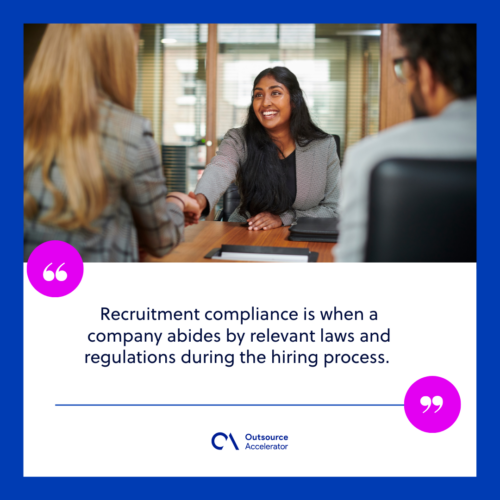Understanding recruitment compliance

When recruiting new employees, there are standard rules and regulations that every company should follow.
Following local laws during the recruitment process ensures that each candidate is treated fairly and that your business does not partake in unjust hiring practices.
Continue reading this article to learn more about recruitment compliance and how to achieve it in your company.
What is recruitment compliance?
Recruitment compliance is when a company abides by relevant laws and regulations during the hiring process. These laws help govern workplaces by instilling ethical and non-discriminatory recruitment practices.
It ensures that candidates are treated well and fairly, which helps maintain the relationship between employer and employee.

Why is recruitment compliance important?
Compliance is crucial in all companies to prevent legal or HR issues. Here are some reasons why businesses must adhere to recruitment compliance rules.
Avoids legal disputes
There are some requirements that the government needs from companies while hiring. Failing to comply with these requirements may result in legal action against the employer.
This may result in paying high fines or incurring penalties that will hurt the company’s reputation.
Promotes inclusivity
The workplace is no place for discrimination, meaning employers must give all applicants a fair chance of getting hired.
If a candidate possesses the skills and qualifications required for the job, the employer should shortlist them and not dismiss the applicant for being a different race, gender, age, or religion.
This encourages diversity and inclusivity in the workplace, which creates an overall positive work environment.
Objectivity when hiring
Recruitment compliance emphasizes the importance of skills and capabilities when getting hired, ensuring that the best people possible are hired for the job.
Additionally, when hiring candidates of various backgrounds, maintaining compliance removes any biases or prejudices and allows the recruitment team to make objective decisions.
Ensures the safety of applicants
One of the key aspects of recruitment compliance is candidates’ safety. This can be in terms of securing their personal data or keeping them safe from accidents or health issues.
Following proper security measures protects your candidates by keeping their personal information from getting leaked.
Furthermore, prioritizing safety ensures that potential candidates are physically and mentally able to work so as to avoid accidents.
Maintains brand reputation
A company that follows recruitment compliance rules and regulations is more likely to be perceived as a reputable one by future applicants.
It establishes your company’s brand, attracting potential talents from everywhere. Furthermore, a firm that cares about its employees increases retention and loyalty.
Key elements of recruitment compliance
Recruitment compliance has several key factors to remember, such as the following:
Equality
One of the core aspects of recruitment compliance is fair and non-discriminatory hiring practices. This ensures that all candidates are treated equally regardless of gender, age, religion, race, or sexual orientation.
Every candidate must be judged objectively, and decisions must be made based solely on their qualifications and skills, giving everyone a fair chance of being hired.

Criminal record
Companies may perform a background check on employees to ensure they have no criminal record. This is to ensure the safety of everyone at the company and that the employee does not engage in any illegal activity.
This element is especially important when working in companies that deal with highly vulnerable people, such as children, senior citizens, or those with disabilities.
Right to work
When we say right to work, it refers to the eligibility of a candidate and prevents illegally or unethically recruiting and hiring individuals.
This is usually done during the recruitment process where, instead of viewing countless resumes, employers verify the identity of a candidate through an identification service provider.
Employers can check a candidate’s documents manually or enlist the help of a third party’s services. The right to work is necessary for all potential candidates, regardless of race, ethnicity, or nationality.
Data protection
When candidates apply for a position and attend an interview, they are revealing information related to their background and experience. Some may even reveal sensitive information about their personal lives.
Hiring managers must make it a priority to keep this information confidential to protect the identities of candidates.
The company must request relevant information only and ask the candidates who were not selected if they want to keep or remove their information from the company system.
Employee contract
Successful candidates will be given an employment contract that discloses all the rules and regulations that come with being hired. This includes the candidate’s responsibilities, work expectations, and benefits.
A key aspect of compliance is offering the candidate their statutory rights, which protect them from unfair and illegal practices and give them the mandated government benefits.
Recruitment compliance laws and practices
There are several laws that help govern recruitment compliance. Here are some key laws to consider:
Title VII of the Civil Rights Act
Title VII of the Civil Rights Act protects individuals from discrimination based on age, gender, sexual orientation, disability, race, or religion.
This law advocates for equal employment opportunities for these people. It aims to protect them from unethical or discriminatory employment practices, such as unfair hiring and firing.
Fair Credit Reporting Act
The Fair Credit Reporting Act ensures the lawful collection of people’s credit information.
If an employer requires this from a candidate for internal purposes, the former must notify the latter beforehand.
Furthermore, the candidate must consent to giving this information. They may also modify details and even appeal if they feel that it is unfair.
Immigration and Nationality Act
This act prohibits discrimination in hiring and firing based on national origin or citizenship.
If your company is based in the United States, you must verify the identity of your candidate and their eligibility to work in the United States using Form I-9.
Occupational Safety and Health Act
Health and safety must be priorities in all companies. The Occupational Safety and Health Act ensures companies follow safety regulations when hiring.
This may include completing standard medical tests to verify a candidate’s physical and mental state to deem that they are eligible to work.
Family and Medical Leave Act
The Family and Medical Leave Act ensures that all eligible employees with family and medical reasons are supported with necessary leaves.
This law is mostly applied to new parents as it protects their right to a leave of absence to take care of their child.
How to achieve recruitment compliance
Recruitment compliance has a lot of steps, but all of them are necessary to ensure orderly hiring practices.
Here are some tips to help you achieve recruitment compliance:
Create a compliant job description
The job description is the first thing your potential candidate will see, so you want to make sure that you follow the proper guidelines when creating one.
For starters, keep it clear and concise so your candidate knows exactly what they are getting into. Highlight all important and relevant information related to the position.
Remember to include the necessary qualifications needed for the role, such as education and experience.
Use neutral language to avoid excluding a certain group of people. Simple terms such as “The candidate” or “You” will suffice. Never use any discriminatory language.
Follow compliant interview guidelines
When you meet your candidate for the first time in an interview, remember to maintain the proper compliant measures.
Use structured, relevant interview questions that only ask about the candidate’s capabilities. Never ask any discriminatory, offensive, or assuming questions.
Check documentation
When screening candidates, make sure that they have all the necessary documents needed when hiring.
This may include signed contracts, right-to-work documents, or medical certificates that show an employee is eligible to work.
These documents ensure that a candidate is clear to work and that the company has complied with the necessary rules and regulations.
Data confidentiality
Data confidentiality is important in maintaining compliance as it prevents data breaches that may put the candidate at risk.
There are several ways to implement data security measures, such as password-protected storage units and encrypted files only authorized users can access. Secure communication channels like encrypted emails also help keep data safe.
Even after the candidate has been hired, staying on top of data protection measures is important. Carefully monitor your data systems if there is any threat of a data breach.

Finalizing offers:
When you decide which candidates to hire, ensure that you continue to follow the necessary compliance measures.
This includes presenting the employment contract that lists all the job responsibilities and expectations. Be transparent about their benefits and other obligations.
Additionally, it is important to include a termination clause, which states the circumstances in which an employee may be fired. This also ensures the employee stays compliant with company rules and regulations.
Protecting candidates with recruitment compliance
Internalizing these practices could mean the difference between having a successful recruitment process and facing legal issues due to failure to comply.
If you want your business to make a good name for itself, pay attention to the importance of recruitment compliance.







 Independent
Independent




